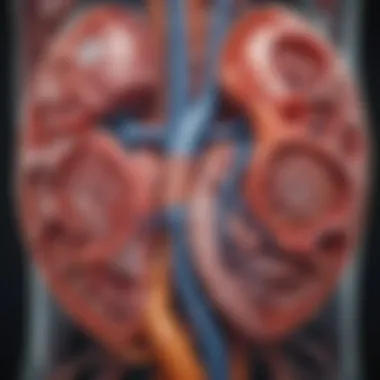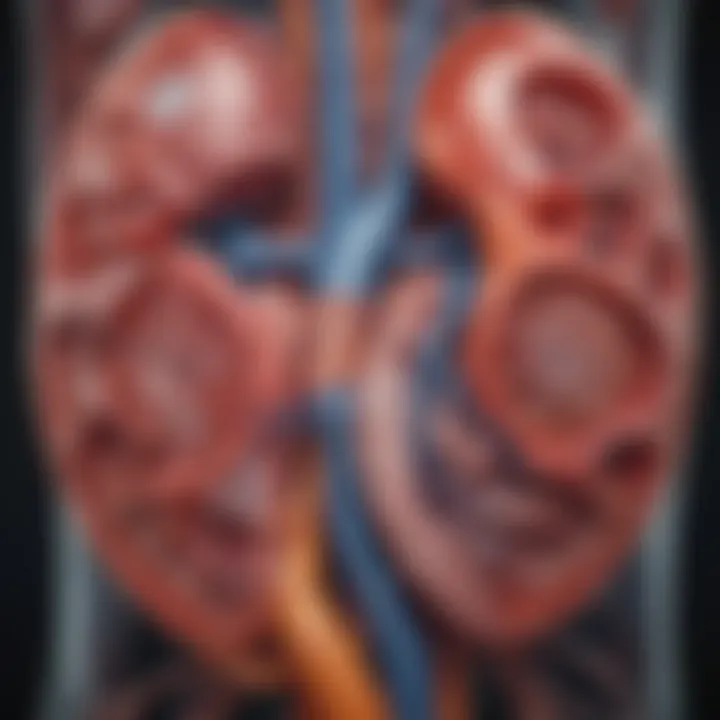Exploring Chronic Kidney Disease: Comprehensive Insights


Intro
Chronic Kidney Disease (CKD) represents a critical public health issue that encompasses a gradual decline in kidney function over time. Understanding CKD involves exploring various dimensions, from its biological basis to its societal implications. Millions of individuals worldwide are impacted by this condition, which can lead to significant morbidity and mortality. Thus, a thorough examination becomes imperative for healthcare practitioners, researchers, and anyone interested in the field of nephrology.
This article intends to provide a detailed analysis of CKD. It will delve into the pathophysiology underlying the disease, outline identifiable risk factors, discuss diagnostic methods, and scrutinize the stages of CKD. Furthermore, it will present current management strategies and relevant research findings aimed at improving patient care.
The focus on CKD is not merely academic; it comes with substantial consequences for patients and healthcare systems alike. As such, this piece aims to broaden knowledge and facilitate discussion surrounding essential aspects of kidney health.
"Understanding the complexities of Chronic Kidney Disease is vital for fostering effective prevention and management approaches."
Equipped with a background of essential information, the following sections aim to illuminate CKD's multifaceted nature, grounding discussions in both research and clinical reality.
Prelims to Chronic Kidney Disease
Chronic Kidney Disease (CKD) is a pivotal public health topic. Understanding CKD is crucial due to its increasing impact on global health systems and society as a whole. This condition involves a progressive loss of kidney function over time, leading to complications that affect numerous body systems. The early identification and management of CKD can significantly alter disease outcome and enhance quality of life.
The importance of this topic is underscored by the fact that healthcare professionals, educators, and policymakers need a comprehensive understanding of CKD. Early diagnosis ensures that patients may receive timely interventions to slow the progression of the disease. By learning about the mechanisms, risk factors, and management strategies relevant to CKD, readers will be better equipped to approach treatment and support for those affected.
Definition and Overview
Chronic Kidney Disease is defined as a gradual loss of kidney function over time, typically defined by a duration exceeding three months. The kidneys, which play a critical role in filtering waste and excess fluids from the blood, maintain electrolyte balance, and regulate blood pressure, become less effective in their duties as CKD progresses. This decline in function can lead to a buildup of waste in the body, causing serious health concerns.
CKD is often categorized into five stages, starting from mild dysfunction in stage one to complete kidney failure in stage five, commonly requiring dialysis or transplantation. Understanding these stages is vital, as it informs treatment plans and helps predict disease progression.
Epidemiology and Prevalence
The prevalence of CKD is substantial and increasing worldwide. According to the Global Burden of Disease Study, approximately 13% of the adult population suffers from some form of CKD. The incidence of CKD rises with age, affecting around 30% of people over the age of 65. Additionally, certain populations are disproportionately impacted. Factors like geographic location, socioeconomic status, and access to healthcare can influence prevalence rates.
Several conditions often coexist with CKD, including diabetes and hypertension, further complicating treatment and management. Early detection is essential because CKD can remain asymptomatic until reaching advanced stages, thereby emphasizing the need for routine screening in at-risk groups.
"Despite its high prevalence, chronic kidney disease is often underdiagnosed, particularly in its early stages."
Understanding the factors contributing to the prevalence of CKD can inform public health initiatives aimed at prevention and early intervention. This insight serves as a critical element in developing effective healthcare policies and strategies.
Pathophysiology of Chronic Kidney Disease
Understanding the pathophysiology of Chronic Kidney Disease (CKD) is crucial for grasping how this ailment affects the human body. The kidneys play vital roles in maintaining homeostasis through the regulation of fluids, electrolytes, and waste removal. A detailed examination of kidney structure and function lays the groundwork for subsequent discussions on mechanisms leading to kidney damage.
Kidney Structure and Function
The kidneys are complex organs, each composed of approximately one million functional units known as nephrons. Each nephron is responsible for filtering blood and forming urine, taking part in crucial processes such as glomerular filtration, tubular reabsorption, and secretion.
The kidney’s structure can be divided into two main regions: the cortex and the medulla. The cortex contains glomeruli, where blood filtration begins, while the medulla houses the renal pyramids, involved in concentrating urine. Healthy kidneys manage the balance of electrolytes, regulate blood pressure, and produce hormones vital for red blood cell production.
When kidney function declines, these processes can become disrupted, leading to a buildup of waste and a variety of systemic consequences.
Mechanisms of Kidney Damage
The evolution of CKD typically involves a progressive cascade of pathological changes. One primary mechanism includes glomerulosclerosis, which represents the hardening of the glomeruli. Factors like hypertension and diabetes mellitus can initiate this damage.
- Inflammation: The kidneys respond to injury with an inflammatory response, which can further exacerbate tissue damage and scarring.
- Tubular Injury: Damage to renal tubules can lead to impaired reabsorption capabilities, resulting in electrolyte imbalances and wasting of essential nutrients.
- Microvascular Damage: Poor blood flow to the kidneys can induce ischemia, contributing to cellular apoptosis and loss of functional tissue.
As the damage progresses, compensatory mechanisms may temporarily sustain kidney function, but eventually, they fail, leading to the clinical manifestation of CKD symptoms.
The recognition of these mechanisms is essential for early intervention and the development of therapeutic strategies aimed at slowing progression or reversing damage.
Identifying the underlying pathophysiological processes is vital not just for diagnosing CKD but also for establishing effective management plans. Strategies such as controlling blood sugar levels in diabetic patients and utilizing antihypertensive medications can significantly influence the course of the disease.
In summary, the pathophysiology of CKD is multifaceted, encompassing structural and functional impairments that ultimately lead to compromised kidney performance. Understanding these concepts is fundamental for healthcare providers, researchers, and educators tasked with tackling this pervasive health issue.
Risk Factors for Chronic Kidney Disease
Chronic Kidney Disease (CKD) is not solely a consequence of aging or unavoidable health issues. Understanding the risk factors that contribute to the development and progression of CKD is essential. Identifying these factors enables healthcare professionals to implement preventive measures, leading to better patient outcomes. Significant aspects include lifestyle choices, genetic components, and the presence of comorbid conditions. By examining these risk factors, we can engage in proactive strategies to delay or even prevent the onset of CKD.
Lifestyle and Environmental Factors
Lifestyle choices play a crucial role in determining kidney health. Factors such as diet, physical activity, and exposure to harmful substances can deeply impact the kidneys. Unhealthy eating habits, particularly diets high in sodium and processed foods, can lead to conditions like hypertension, which in turn significantly increases the risk of CKD. Smoking is another detrimental factor, as it contributes to vascular damage and subsequent kidney impairment. Additionally, limited physical activity contributes to obesity, which is associated with several health complications, including diabetes and high blood pressure. Thus, adopting a healthier lifestyle is not just beneficial for the kidneys, but for overall well-being.
Genetic Predisposition


Genetics also play an undeniable role in CKD risk. Certain genetic traits predispose individuals to kidney disease. For example, familial history of kidney failure increases the likelihood of CKD. Specific genetic markers may influence how an individual's body responds to such conditions as hypertension or diabetes. Notably, advances in genetic research could pave the way for new screening methods. Understanding genetic predispositions helps in assessing individual risk and planning interventions proactively. The study of genetics remains a promising field, potentially leading to personalized medicine solutions tailored to keep CKD at bay.
Comorbid Conditions
The presence of multiple health conditions can significantly influence the development of CKD. Key comorbidities include Diabetes Mellitus, Hypertension, and Cardiovascular Disorders.
Diabetes Mellitus
Diabetes is one of the leading causes of CKD. High blood sugar levels over time damage blood vessels in the kidneys, impairing their ability to filter waste effectively. This is particularly critical because a significant proportion of individuals with CKD may remain unaware of their diabetes diagnosis. Monitoring and controlling blood sugar levels can prevent or delay kidney damage, making diabetes management essential in any CKD prevention strategy.
Hypertension
Hypertension contributes to CKD through increased pressure on the blood vessels in the kidneys. Over time, this stress can lead to scarring and loss of kidney function. The relationship between hypertension and CKD is bidirectional; not only can high blood pressure cause kidney damage, but CKD can also exacerbate hypertension. Therefore, effective blood pressure management is a significant aspect of preventing CKD.
Cardiovascular Disorders
Cardiovascular disorders are intricately linked to CKD, creating a cycle of health complications. Many patients with CKD also experience cardiovascular issues. Understanding this relationship is essential, as both conditions share common risk factors such as diabetes and hypertension. Addressing cardiovascular health can contribute positively to managing CKD, emphasizing the need for a holistic approach in patient care.
Proper management of comorbid conditions is fundamental in reducing the risk of CKD and its associated complications.
Diagnosis of Chronic Kidney Disease
Diagnosing Chronic Kidney Disease (CKD) is a critical aspect of managing the condition effectively. Early detection can significantly improve patient outcomes by allowing for timely interventions. Understanding the various methods of diagnosis helps healthcare professionals establish a clear picture of the patient's kidney health and potential risks. This section will outline both clinical assessments and laboratory tests that are fundamental to the process of diagnosing CKD, ensuring a comprehensive understanding of this essential area.
Clinical Assessment
Clinical assessment involves a thorough evaluation of the patient’s medical history, physical examination, and review of symptoms. Healthcare providers typically focus on identifying risk factors such as family history, lifestyle choices, and existing health conditions. During the physical exam, physicians may check for signs of fluid retention in the body, changes in blood pressure, and other indications of kidney trouble.
The importance of clinical assessment lies in its ability to gather comprehensive information beyond mere laboratory results. It helps in constructing a holistic view of the patient’s kidney health while considering factors such as age, sex, and ethnic background. An undiagnosed condition may progress unnoticed, leading to potential complications. Early identification of CKD symptoms allows for timely lifestyle modifications and medical management.
Laboratory Tests
Laboratory tests are essential in confirming CKD diagnosis. They provide measurable evidence of kidney function and help determine the severity of the disease. These tests generally include Serum Creatinine, Urinalysis, and the estimated Glomerular Filtration Rate (eGFR). Each of these tests provides unique insights into kidney health, guiding further management.
Serum Creatinine
Serum Creatinine is a widely used biomarker in assessing kidney function. It is produced by muscle metabolism and is consistently filtered out by healthy kidneys. The level of creatinine in the serum indicates how well the kidneys function; higher levels suggest impaired kidney function.
One of the advantages of Serum Creatinine is its availability as a routine test in many clinical settings. This makes it a popular choice among healthcare providers. However, one limitation is that it may not accurately reflect kidney function in all populations, particularly in those with varying muscle mass. Thus, while it is beneficial, it should be interpreted with caution.
Urinalysis
Urinalysis is another valuable diagnostic tool that examines the physical, chemical, and microscopic properties of urine. It helps identify abnormalities such as proteinuria, hematuria, or the presence of casts, all of which might suggest kidney damage or dysfunction.
The unique feature of urinalysis lies in its ability to provide immediate insights into renal health without needing invasive procedures. Regular urinalysis can be advantageous for monitoring kidney health over time. However, it is essential to understand that urinalysis alone is not definitive for diagnosing CKD. Hence, it is often used in conjunction with other tests for more accurate results.
eGFR Calculation
The estimated Glomerular Filtration Rate (eGFR) is crucial for assessing kidney function. It estimates how well the kidneys filter waste products from the blood. eGFR calculations typically factor in serum creatinine levels, age, gender, and race.
A key characteristic of eGFR is its ability to stage CKD, which assists in planning the appropriate management strategies. eGFR holds significant importance for healthcare providers as it provides a clearer picture of kidney function compared to creatinine alone. However, it uses approximations and may not account for all variations, particularly in people with rapidly changing kidney function. Hence, eGFR results should be interpreted with other tests and clinical information for a comprehensive understanding.
"Early diagnosis of CKD can lead to better management and slower progression of the disease, which significantly impacts patient quality of life."
In summary, the diagnosis of Chronic Kidney Disease is a multifaceted process that involves both clinical assessments and laboratory tests. Each tool has its strengths and weaknesses, and their combined use improves the accuracy and reliability of the diagnosis. This understanding forms the basis for effective management strategies that can enhance patient outcomes.
Stages of Chronic Kidney Disease
The classification of stages in Chronic Kidney Disease (CKD) is crucial for understanding the severity and progression of the disease. Each stage reflects a specific level of kidney function, as measured by the estimated glomerular filtration rate (eGFR), which can influence treatment decisions and patient outcomes. Recognizing these stages allows healthcare providers to tailor management plans effectively and to monitor the progression of the disease over time. Patients and their families benefit from understanding their condition as it empowers them to make informed decisions regarding lifestyle modifications and treatments.
Classification of CKD Stages
Chronic Kidney Disease is generally classified into five distinct stages:
- Stage 1:
- Stage 2:
- Stage 3:
- Stage 4:
- Stage 5:
- eGFR of 90 or higher
- Normal or increased kidney function with some signs of damage, such as protein in the urine.
- eGFR between 60 and 89
- Mildly reduced kidney function with possible damage.
- Divided into 3A (eGFR 45-59) and 3B (eGFR 30-44)
- Moderate reduction of kidney function; symptoms may begin to appear.


- eGFR between 15 and 29
- Severe reduction of kidney function; patients experience significant symptoms and complications.
- eGFR less than 15
- End-stage renal disease (ESRD) requiring dialysis or transplantation.
This classification system is key in framing the conversation around CKD management and patient care strategies.
Progression of Disease
CKD is typically a progressive disease, and understanding its trajectory is imperative for effective healthcare management. The progression of CKD involves a gradual decline in kidney function over time, which can vary widely among individuals. Factors influencing disease progression include:
- Diabetes: High blood sugar can damage kidney blood vessels.
- Hypertension: Increased blood pressure can strain the kidneys.
- Age: Older adults may naturally have declining kidney function.
- Lifestyle: Poor diet and lack of exercise can hasten progression.
Monitoring the stages helps identify patients at higher risk for complications. Regulatory measures, including lifestyle changes, pharmacological interventions, and nephrology referrals, can slow progression significantly.
"Understanding the stages of CKD provides a roadmap for treatment and empowers patients to actively participate in their care."
In summary, grasping the concept of CKD stages is integral for patients and healthcare professionals alike. It guides treatment, informs management, and enhances the dialogue surrounding chronic kidney disease.
Management of Chronic Kidney Disease
Managing Chronic Kidney Disease (CKD) is critical for maintaining patients’ health and quality of life. Proper management can delay the progression of the disease and reduce the risk of complications. It involves a multifaceted approach that includes lifestyle modifications, pharmacological interventions, and in some cases, surgical options such as dialysis and transplantation. Effective management of CKD not only aims at improving kidney function but also focuses on overall well-being. This is essential because CKD can significantly impact cardiovascular health, bone metabolism, and anemia.
Lifestyle Modifications
Dietary Changes
Dietary changes are a cornerstone in the management of CKD. A well-designed diet can directly influence the progression of the disease and improve quality of life. One key characteristic of dietary changes is the reduction of sodium intake. Lower sodium helps manage blood pressure, which is crucial for patients with kidney issues. Furthermore, controlling protein intake can prevent excessive strain on the kidneys. This makes a plant-based diet popular among nephrologists. However, patients should consult with a dietitian to tailor dietary changes to their specific needs.
Advantages of dietary changes include improved metabolic parameters and reduced uremic symptoms. On the flip side, strict dietary modifications may lead to the risk of malnutrition if not monitored properly.
Physical Activity
Regular physical activity contributes to the management of CKD by helping maintain a healthy weight and lowering blood pressure. One key characteristic of physical activity is its role in improving cardiovascular health. This is particularly advantageous since CKD often coincides with increased cardiovascular risk. Incorporating moderate exercises, such as walking or swimming, is usually recommended. However, the unique feature of physical activity is that it must be tailored to each patient’s condition. Some individuals may have physical limitations that restrict their activity levels.
The benefits of increased physical activity include enhanced mood and lower rates of depression, which is common among CKD patients. Nonetheless, care must be taken to avoid overexertion, as this could lead to additional health issues.
Pharmacological Interventions
Antihypertensives
Antihypertensive medications are crucial in managing CKD, particularly for those with coexisting hypertension. These medications help control elevated blood pressure, which is a common complication. A notable characteristic of antihypertensives is that they can preserve kidney function by lowering the stress on the glomeruli. Common choices include ACE inhibitors and ARBs, both known for their protective effects on the kidneys. Their benefit lies in the dual approach of managing both hypertension and decreasing proteinuria.
Yet, the unique feature of antihypertensives is their potential side effects, which may include dizziness and changes in electrolytes. It is essential to monitor patients closely to ensure optimal dosages and minimize risks.
Renin-Angiotensin System Inhibitors
Renin-Angiotensin System inhibitors, such as ACE inhibitors and angiotensin receptor blockers (ARBs), have shown significant effectiveness in CKD management. Their primary role is blocking the renin-angiotensin system, which regulates blood pressure and fluid balance. A key characteristic of these inhibitors is their ability to reduce albuminuria, an important marker of kidney damage. By lowering blood pressure and preserving renal function, they are essential in slowing CKD progression.
The advantages of renin-angiotensin system inhibitors extend beyond controlling hypertension, also offering cardiovascular protection. However, some patients may experience increased potassium levels, impacting heart health. Regular monitoring is vital
Dialysis and Renal Replacement Therapy
Dialysis is a lifesaving procedure for patients with advanced CKD. It serves to remove waste products and excess fluids from the body when the kidneys can no longer perform these functions effectively. There are two main types: hemodialysis and peritoneal dialysis. Both types require careful consideration of the patient's lifestyle preferences and medical condition. Dialysis also demands regular sessions, which can be time-consuming but essential for patient survival. The management of fluid and dietary intake remains crucial during this therapy to avoid complications.
Kidney Transplantation
Kidney transplantation represents a definitive management option for advanced CKD. It offers the potential for improved quality of life and, often, better longevity compared to dialysis. A key aspect of transplantation is careful candidate selection, as not all CKD patients are eligible. The transplantation process requires an extensive evaluation and ongoing immunosuppressive medications to prevent rejection. The unique feature of this treatment option is its potential for renal function restoration. However, the disadvantages include the risk of surgical complications and the necessity for lifelong medications.
"The management of Chronic Kidney Disease is a dynamic process that requires ongoing assessment and a multidisciplinary approach to ensure optimal care."
Related resources: Wikipedia on Chronic Kidney Disease , Britannica on Kidney Health
Complications Associated with Chronic Kidney Disease
Chronic Kidney Disease (CKD) is a progressive illness that can lead to numerous complications affecting various body systems. Understanding these complications is critical for effective management and improving patient outcomes. In particular, the interconnectedness of kidney function and other organ systems necessitates a comprehensive approach to treatment and patient care. The long-term effects of CKD can greatly influence a patient’s quality of life, making awareness and early intervention vital.
Cardiovascular Complications
Cardiovascular complications are among the most pressing issues in CKD patients. The risk of developing heart disease increases significantly in those with impaired kidney function. This correlation is primarily due to the retention of uremic toxins, fluid overload, and alterations in electrolyte balance, which can increase blood pressure. Furthermore, patients with CKD often have comorbid conditions such as diabetes and hypertension that further exacerbate cardiovascular risks.


Research indicates that patients with CKD have a higher likelihood of experiencing heart attacks and strokes. Regular monitoring of cardiac health in CKD patients is essential. Clinicians often recommend lifestyle modifications, medication adjustments, and routine screenings to manage cardiovascular risks effectively. Books, guidelines, and clinical studies provide insight into effective treatment strategies aimed at mitigating these dangers.
Bone Mineral Disorders
Bone mineral disorders represent another significant complication associated with CKD. As kidney function declines, the body's ability to maintain calcium and phosphorus balance is impaired. This can result in renal osteodystrophy, a condition where bones weaken and become more brittle. Alterations in Vitamin D metabolism are also prevalent in CKD patients, leading to decreased calcium absorption from the gut.
Effective strategies to manage bone mineral disorders include targeted nutritional adjustments and pharmacological treatments. Doctors may prescribe phosphate binders and Vitamin D supplements to help manage these complications. Additionally, education about dietary restrictions and the importance of regular follow-ups can empower patients in their management plan.
Anemia and its Management
Anemia is a common and often overlooked complication in patients with chronic kidney disease. Due to reduced erythropoietin production by the kidneys and the accumulation of toxins, anemia can adversely impact patient well-being. Common symptoms of anemia include fatigue, weakness, and decreased exercise tolerance.
To manage anemia effectively, a multi-faceted approach is necessary. This may include:
- Erythropoiesis-stimulating agents (ESAs) – these help stimulate red blood cell production.
- Iron supplementation – essential to improve hemoglobin levels, especially if iron deficiency is identified.
- Regular monitoring of hemoglobin levels to assess the effectiveness of treatments.
Educating patients about the importance of managing anemia is crucial. The goal is to enhance their quality of life and prevent complications associated with low hemoglobin levels, such as heart failure.
It is vital that healthcare professionals remain vigilant in recognizing the complications of CKD to ensure comprehensive patient management.
In summary, the complications associated with chronic kidney disease encompass a range of issues that extend beyond renal function alone. Cardiovascular health, bone mineral density, and anemia management are crucial areas of focus. An integrated approach can enhance patient outcomes, emphasizing the need for awareness, education, and timely intervention in CKD care.
Recent Research and Innovations in CKD
Chronic Kidney Disease (CKD) represents a growing health issue, as it affects a significant portion of the global population. With the rising prevalence of risk factors like diabetes and hypertension, understanding CKD is more critical than ever. Recent research and innovations provide new insights into the mechanisms of CKD and propose various strategies for improving patient outcomes. The continuing evolution in this field is essential to enhance diagnostics, treatment, and management practices for CKD. This section will delve into advancements in biomarkers and emerging therapeutic targets, highlighting their implications in patient care.
Advancements in Biomarkers
The utilization of biomarkers is crucial for the early detection and monitoring of CKD. Traditional markers, like serum creatinine, have limitations in sensitivity and specificity. Recent studies underscore the importance of novel biomarkers for providing a more accurate picture of kidney health. These include:
- Cystatin C: This protein serves as an alternative measurement for kidney function, often providing a more sensitive estimation of glomerular filtration rate (GFR).
- Neutrophil gelatinase-associated lipocalin (NGAL): Found to increase in the urine of patients with acute kidney injury, NGAL shows promise for early identification of kidney stress and subsequent damage.
- Kidney injury molecule-1 (KIM-1): This biomarker has applicability in assessing tubular injury and may assist in differentiating AKI from CKD.
These advancements not only enhance the detection of renal impairment but also improve prognostic capabilities, guiding healthcare professionals in making informed decisions on treatment paths.
"The integration of novel biomarkers can significantly shift the landscape of CKD diagnosis, enabling more timely and targeted interventions."
Emerging Therapeutic Targets
The landscape of therapeutic approaches for CKD is changing, with an emphasis on targeting specific pathways involved in kidney damage. Recent research has led to the identification of novel therapeutic targets that can potentially halt or even reverse kidney disease progression. Some notable examples include:
- SGLT2 inhibitors: Drugs like Canagliflozin and Dapagliflozin have shown efficacy by not only lowering blood glucose but also providing renal protection. Their ability to reduce albuminuria marks them as critical players in CKD management.
- Fibroblast growth factor 23 (FGF23): Understanding the role of FGF23 in mineral metabolism has led to studies exploring therapies that can modulate its action, potentially addressing bone mineral disorders common in CKD patients.
- Renal denervation: This technique offers an innovative approach to lowering blood pressure in resistant hypertension, a common comorbidity in CKD patients.
Exploring these emerging targets allows researchers to develop more effective management strategies that cater directly to the underlying pathology of CKD. As the understanding of CKD deepens, the incorporation of these innovations into clinical practice promises to enhance patient care and outcomes.
End
Chronic Kidney Disease (CKD) is a multifaceted condition that poses significant health risks worldwide. Understanding its implications is essential for both health professionals and the general public. This conclusion emphasizes the importance of recognizing CKD as not only a medical issue but also a societal concern that influences quality of life and has economic implications.
Key elements from this article illustrate the progression of CKD, highlighting critical points such as diagnostic techniques and management strategies. Addressing risk factors, the article presents an imperative call for lifestyle changes. Preventing CKD or mitigating its effects requires a proactive approach to health care practices. The importance of early detection through routine screening cannot be overstated; it can lead to better patient outcomes and more effective management of the disease.
In addition, the article discusses recent advancements in research, providing a glimpse into potential future treatments. Continuous research efforts are needed to explore innovative therapies. These advancements focus on targeting specific mechanisms involved in kidney damage, which can revolutionize the management of CKD.
Benefits of understanding CKD include:
- Improved patient care through better awareness
- Enhanced public health initiatives aimed at prevention
- Greater collaboration among researchers to identify gaps in knowledge
Overall, raising awareness about CKD and its complications is crucial. Emphasizing education will undoubtedly lead to better health practices and improved outcomes. As research evolves, we must remain informed about future developments in CKD management.
"The future of Chronic Kidney Disease management hinges on our ability to adapt and innovate. For the welfare of countless individuals, this is not just preferable; it is necessary."
Future Perspectives in CKD Research
The landscape of Chronic Kidney Disease research is ever-evolving. Recent studies have begun to unveil the complexities of CKD at a molecular level. Future research avenues will likely focus on several key aspects:
- Biomarkers: The identification of novel biomarkers for early detection.
- Genomic Studies: Investigating genetic predispositions to CKD.
- Regenerative Medicine: Exploring stem cell therapies and tissue regeneration.
- Patient-Centric Approaches: Emphasis on personalized medicine.
- Technological Advancements: Utilization of Artificial Intelligence in predicting CKD progression.
- Biomarkers could help in assessing kidney function before significant damage occurs.
- Tailored treatments based on genetic insights can yield better outcomes.
- These innovations offer hope for repairing damaged kidneys.
- Taking into account individual lifestyle and genetic factors can improve treatment efficacy.
- AI can enhance understanding of patient-specific disease trajectories.
Continued collaboration among researchers and healthcare providers will facilitate the integration of new findings into clinical practice. As we enhance our understanding of the mechanisms behind CKD, the potential for developing targeted therapies increases. This underscores the need for sustained funding and interest in CKD research. The future holds possibilities for significant advancements in patient care, emphasizing the necessity for ongoing dialogue and exploration in this vital field.







